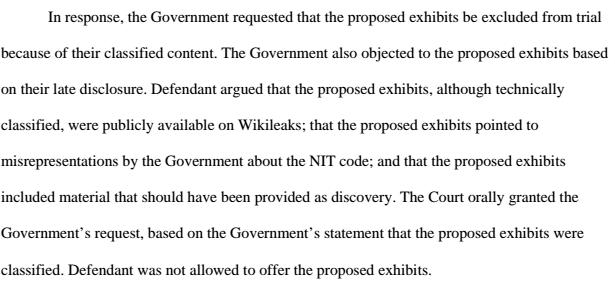Last week, the US government may have confirmed the authenticity of a number of CIA documents concerning the agency's hacking operations, but not in the way you might expect.Judging by a recent court filing, at least some of the CIA files Wikileaks published earlier this month are genuine, because the government pushed back against having them admitted in court due to the documents' classified content.
Advertisement
"The government is not able to declare non-government records as classified, unless they are taking ownership of the records themselves," Bradley P. Moss, a national security attorney, told Motherboard in an email.The files Wikileaks published include details on how the CIA allegedly developed malware for smart TVs, had access to a series of iOS exploits, and apparently borrowed code from public malware samples.Strangely, the court filing was made in a largely unrelated case involving the FBI's own hacking capabilities. In February 2015, the FBI took over a dark web child pornography site called Playpen, and deployed a network investigative technique—a piece of malware—in an attempt to identify the site's users.That investigation has led to hundreds of arrests, but also dozens of contentious court cases across the US. Defense teams have battled over the legality of the warrant used to authorize the hacking operation, as well as access to the source code of the exploit used to hack their clients' computers.In this case, federal public defender Colin Fieman wanted to admit some of the Wikileaks documents into court. The idea was to bolster his argument that even with a forensic examination of the defendant's computer, it would not be possible to see whether someone else planted child pornography on the machine, because the exhibits may show the US government has "the ability to hack into a computer without leaving any trace," the court filing, written by District Judge Robert J. Bryan, reads.
Advertisement
Whether or not that argument actually holds water is largely irrelevant, as the government did not want the Wikileaks documents included in the case at all."In response, the Government requested that the proposed exhibits be excluded from trial because of their classified content," Bryan wrote.

Moss, the national security attorney, added, "Based solely on the language in the Court's order, I would argue that the Government (whether deliberately or unwittingly) confirmed the authenticity of the specific documents produced by the defendants."Patrick Toomey, a staff attorney at the American Civil Liberties Union, wouldn't comment on whether the filing indicated a confirmation of the CIA documents or not, but told Motherboard in an email, "What's troubling in this case and others is that the government seems to want to have it both ways. It refuses to officially confirm the authenticity of documents published in the press, but it then relies on the fact that the documents are classified in order to bar defendants and others from relying on these publicly available materials in court."In a Twitter direct message, Wikileaks told Motherboard that the apparent authentication was no surprise.
"If you bet against Wikileaks over authentication you are going to lose," Wikileaks wrote.Interestingly, the Department of Justice is trying to retroactively seal the court filing and two others, because they apparently reference matters discussed in a portion of a transcript that is already shut-off from public view.In a rare public statement issued earlier this month, the CIA did not comment on the authenticity of the documents Wikileaks published, but said in-part, "The American public should be deeply troubled by any Wikileaks disclosure designed to damage the Intelligence Community's ability to protect America against terrorists and other adversaries."Peter Carr, a spokesperson for the Department of Justice, told Motherboard in an email that, "The government lawyers in the case had no knowledge of, and therefore were in no position to confirm in any way the authenticity of the defendant's supplemental exhibits that were provided to them without prior notice. They did, however, express concern to the court that some of the documents might be classified based solely on the markings on some of the documents."Update: This piece has been updated to include comment from the Department of Justice.Subscribe to pluspluspodcast , Motherboard's new show about the people and machines that are building our future.
